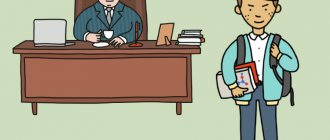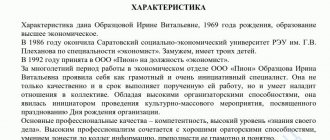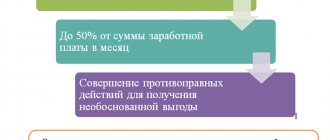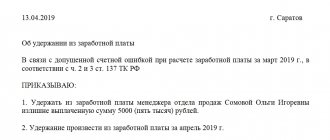Characteristics for a school student are one of the most important psychological and pedagogical documents, the preparation of which is relevant: both when changing places of study, and for submission as a recommendation to various authorities.
Below are examples (samples) of characteristics for students from different groups. They can be suitable for students of different grades, starting with primary: 1,2,3 and ending with the rest: 4,5,6,7,8,9,10.
Sample characteristics for a dysfunctional family
This family lives at: …. The living conditions in which (student’s name) lives are satisfactory. The apartment is in relative order, cleaning is carried out regularly, but some cosmetic repairs are required. (student's name) has a separate room where all conditions are created for studying and preparing homework. Besides... there are two more children in the family. The older brother,..., studies in... the city of..., the younger brother,..., attends kindergarten.
Parents do not have uniform requirements for their child; they often do not know where and with whom (child’s name) spends his free time. The daily routine is not followed. The parents were found drunk, so the family is in a socially dangerous situation. This has a negative impact on the child's academic performance. There is no constant monitoring of the child’s progress at school or homework completion. (student's name) has no motivation to study. Parents show no interest in the child's successes and failures. As a result, problems with studying at school. The father attends parent-teacher meetings more often. (Father’s first name and patronymic) responds adequately to teachers’ recommendations and advice.
An example of a positive characteristic for a boy student
Alexander Ivanov has been studying at the State Institution “Secondary School No. 19” in Sverdlovsk since the first grade. The student has good physical and mental development. Responsible and hardworking. Possesses independent work skills. Able to compare, analyze, and clearly express his thoughts.
In the 8th year of study, Alexander moved to the mathematics class. He prefers humanities subjects and is interested in history and law.
Alexander complies with the school regime and established rules of behavior. Doesn't miss classes for no reason.
Main character traits: calm, balanced, avoids conflicts.
Performs any assignments unconditionally and responsibly. Actively participates in school events.
There are no bad habits.
He is hardworking, possesses the necessary work skills, and is careful and precise in his work. Self-confident, accurately assesses his own capabilities, strives for success, primacy, decisive, persistent.
He is distinguished by good manners and modesty. Tactful, friendly. He is friends with his classmates. Very obliging, worries about the outcome of the assignment. Enjoys authority.
Parents are interested in the success of their child. Constantly communicate with the class teacher. Provide all possible assistance in matters of class functioning.
An example of a psychological and pedagogical characteristic for a preschool education student
Features of gaming activities. In games with other children, she mainly takes the lead/passive/aggressive/other
position,
describe the main manifestations: sets the rules, gets offended, takes away toys, fights, etc.
Prefers
role-playing/active games/games according to the rules/independent games with toys
.
In games with toys, there is a stable/unsustainable
interest in toys;
actions with toys are/are not focused
on the properties and purpose of these toys, the target component of the game
is/is not formed (describe examples)
;
the breadth/narrowness
of the use of substitute items
is noticeable actions with toys are/are not accompanied by
verbal instructions or a story.
During games according to the rules, understands/does not understand
the rules,
follows/does not follow
the rules of the game;
performs game actions
clearly and correctly/fuzzy and inaccurately In a role-playing game, the accessibility/inaccessibility
of an imaginary situation,
the breadth/poverty
of game plots,
stability/instability
in taking on a game role, and
leaving/not leaving
the role during the game are noted.
During the game, reflects/does not reflect
one’s own life experience.
The child's play activity is characterized by listing the distinctive features and characteristic actions
.
Favorite game - indicate which one and why
.
Upon entering kindergarten, adaptation was poor/with great difficulties/quite easy/easy
:
cried/did not cry
when parting with parents,
when he stopped crying, showed/did not show
interest in the group room, toys, peers, adults;
From the first days I ate lunch and stayed to sleep
.
Social and pedagogical characteristics of the student
Communication skills . formed. Socio-psychological status in the group (“star/preferred/leader/rejected/isolated”). Features of social contacts: the nature of relationships with classmates (disturbed / conflictual / does not provoke conflicts / smooth / calm, interferes with other children in games, laughs at them, offends weaker ones, exposes himself, clownishes, plays the role of a “clown”, often quarrels with classmates , pesters everyone, is on bad terms with some of them, is unloved by other children, is often made fun of, fights, bites, scratches, uses dangerous objects as a fighting weapon, is withdrawn, isolated from other children, prefers to be alone, to communicate with peers prefer loneliness, a tendency towards leadership or conformity is revealed). Relationships with teachers (even/friendly/calm/conflict/provokes conflict, treats the teacher with respect and maintains the necessary distance in communication with him, practically does not interact with teachers, looks shy, gets lost, is shy, avoids contact with teachers, tries to be inconspicuous, timid, can make a request to the teacher, listens to the teacher’s comments and demands, tries to fulfill them, does not fulfill the requirements, answers impudently, rudely, shows negativism towards the teacher).
Conclusion: what and why happens to the child; under what conditions changes are observed (positive or negative); compliance of the level of education with pedagogical requirements; the reasons that caused the violations; forecast of his further development and education (possible changes under certain conditions); recommendations for optimizing interaction in the child’s environment (family, teachers, children’s team), indications and contraindications for the child.
How to write a testimonial about a child SoP in Dou
The boy is sociable, prefers to play with children in a group, takes part in role-playing games with pleasure, worries in outdoor games if for some reason one of the children does not want to play with him, and tries to solve this problem on his own.
- · very often in spontaneous speech there is an unclearness of speech production: in situations of excitement or emotional stress, omissions of syllables, partial nasalization of the voice, lexical agrammatisms are observed
- · slight impairment of auditory-pronunciation differentiation of oppositional sounds in syllables
- · in sound pronunciation – softening of the sound L (due to reduced tone of the muscles of the articulatory apparatus)
- · minor improvements in sound-syllable structure: omissions and replacements of sounds and syllables in multi-frequency words and phrases are still frequent
- · possesses the simplest skills of sound-syllable analysis and synthesis
- · vocabulary at an average level, the passive vocabulary is wider than the active one, makes simple generalizations, has difficulty choosing antonyms
- · in spontaneous speech - phrases of up to 5 - 7 words: simple, common, with complication, occasionally - agrammatic in stories based on plot pictures, identifies 2-3 parts, reveals micro-topics mainly sequentially, briefly, quite accurately, uses little expressive means, sometimes there are lexical and structural agrammatisms retelling - close to the text
- · lexical and grammatical skills are not yet sufficiently developed: there are difficulties in the formation of relative, qualitative, possessive adjectives, some prefixed verbs; unstable errors in the formation of plural nouns of the Genitive case, rarely used plural nouns of the Nominative case, diminutive form of nouns in agreement of nouns with numerals in the use of prepositional case constructions
- · in impressive speech: has difficulties in differentiating prefixed verbs, in understanding complex prepositional-case constructions, complex comparisons, inversion, constructions in the instrumental case, multi-part instructions, abstract concepts, figurative and hidden meaning, sentences with complex lexical and grammatical structure
- · reads simple words and phrases (when reading, errors of an optical and undifferentiated nature are observed)
- · writes his name in block letters, takes simple words from dictation, copies printed words (errors are often observed: omissions and replacements of letters based on optical characteristics).
We recommend reading: How to obtain Russian citizenship for a citizen of Turkmenistan 2021
Characteristics of a student from SOP
Orients himself in the surrounding world. Sometimes he is active in lessons about the world around him, but as a rule he shouts out answers from his seat. Vika does not know her date of birth. Can name his last name, first name and parents. Can name the days of the week, seasons of the year with a hint. Not everyone knows the names of the months; they cannot name them in order.
Physically the child is well developed. During lessons she is impatient, restless, fidgets in her chair, and gets tired quickly. During lessons he is involved in extraneous activities. Often forgets to prepare for class. Cannot plan his activities. Has difficulty navigating notebooks. Keeps up with the general pace of the class, has difficulty learning to write. Cannot concentrate on a task, requires instruction when completing tasks. The activity is unsustainable. In the situation of carrying out testing work, inhibition is noted (slowness, does not complete some tasks). There is a lack of attention. The pace of work is average.
Characteristics for a pupil d
Mechanical recalculation within 10. Dasha counts according to the verbal instructions of an adult, does not correlate the object with the quantity, with the number. The perception of quantities is not impaired. Confuses colors and names shapes with the help of an adult. Selects a given number of objects from a set only with the help of the teacher. The concepts “one-many”, “big-small”, “more-less”, “equally” are accessible, but the concept “as many-how many” is not.
The girl shows a strong interest in a new toy or game and uses the toy adequately. Able to use substitute objects. When entering into role dialogue, he answers questions and asks them according to the accepted role. Interacts well with a subgroup of children, but does not always initiate new games and ideas. Plays a secondary role in games. Always obeys the game rules.
Characteristics of a 6th grade student in SOP
In the class team, relations with classmates were smooth. __________ is sociable, gets along with all the kids in the class, communicates with students from other classes, but does not enjoy authority among his classmates. Has satisfactory academic performance for the year. He is not always attentive in class and takes teachers’ comments regarding behavior and preparation for lessons calmly, but does not draw conclusions for himself. Doesn't miss classes without a good reason.
Participates in class and school events, but not always willingly. He tries to take orders seriously. During the year, he took part in the annual event “Yenisei Day”, cleaning the territory of the “Fallen Warriors” memorial, a class hour dedicated to “Victory Day”, etc.
Characteristics of a child in a preschool educational institution from a teacher: sample
The closest and dearest thing to every person is his family. It is in the parental home that the child receives initial life experience in the fullness of its moral and social manifestations. It is no secret that raising children is the main task of a family. Hard work, as well as the spiritual wealth of the father and mother, have a beneficial effect on children.
So, when writing a description of a child, the teacher indicates whether the child knows his last name and first name; understands family ties (father, mother, grandmother) or not; whether or not he has a sufficient range of ideas about everything that surrounds the baby.
Characteristics of a student from a disadvantaged family with bad behavior
Ilya Klyuchevsky has been studying at the State Institution “LSOSH No. 4” in Lipetsk since the 1st grade. The educational process does not arouse interest in the boy, but it is worth noting his absolute attendance. Capable of mastering educational material in large volumes, but general passivity during learning leads to a low level of knowledge.
Not demanding of himself. Memory can be characterized as random mixed. If you manage to interest him, then he shows himself best in the exact sciences. The stability of results is hampered by the lack of hard work and diligence. Indifferent to what is happening in the class, inactive. Doesn't do homework. Speech is developed.
Has all the necessary work skills, but tries to avoid personal assignments and social events.
Has good physical shape. At the amateur level he plays football and tennis.
During contacts with classmates and teachers, he may show aggressiveness and stubbornness, often his actions are impulsive and too emotional. Not disciplined, prone to independence, able to defend his personal point of view. Honest.
He systematically violates the rules of conduct, is registered with a social teacher, and has had numerous conversations with the school psychologist.
Does not have due respect from classmates. He is friends with younger students and is a leader among them.
Caught smoking.
Lives with his mother and sister. The mother is not involved in raising children, citing work. He does not attend school and avoids communicating with the class teacher.
How to write a testimonial about a child SoP in Dou
Speech state:
sound pronunciation is impaired. The syllabic structure of words is not sufficiently formed. Phonemic processes at the formation stage. The lexical and grammatical structure of speech is below the age norm. Coherent speech is not age appropriate.
Character traits.
Relationships with the children of the group are good and smooth. Denis is calm, responsive and balanced. Often shows low self-esteem, withdraws (due to impaired speech development), and feels insecure. Touchy. He rejoices at his successes. Encouragement stimulates. In case of any difficulties, he does not ask for help.
We recommend reading: Is it possible to pass a medical examination without a passport and insurance policy for money?
Characteristics of a student who is a member of the Sop according to the example
Makes a lot of mistakes and does not notice them when checking. During a collective discussion and explanation of any tasks, the meaning is not grasped. In his notebooks, the tasks were completed incorrectly, even if the same tasks were completed on the board and checked. Understands the material better only after individual additional lessons. The child’s speech development level does not correspond to the age norm. The student has a delay in the development of phonemic perception: the student cannot analyze the sound and syllabic composition of a word, allowing omissions, rearrangements, and additions of letters. Based on the text he listened to, the student answers questions in monosyllables, cannot form a common sentence, or carry out a consistent, accurate retelling. He has insufficient clarity of speech, a quiet and hesitant voice, low speech activity and a pale emotional coloring of independent statements.
This is interesting: Seizure of property from a disabled person
Sample of writing a student profile. 1. General information about the student. Last name, first name, age, class. nationality, appearance, professional activity (occupation), parents, extracurricular interests of the student.
LAWYER'S DIRECTORY ->
4. Characteristics of activities: self-care skills: can he independently use toiletries, wash his face, wash his hands, comb his hair, can he dress, undress, put on his shoes independently, can he be shy, tie and untie his shoelaces, use a spoon, fork, can he put his things away and bed.
Vanya likes productive activities: he learns to draw small details of objects, and copes well with appliqué and design. Works autonomously and quickly, often “decorating” crafts by adding parts of objects.
How to write a testimonial about a child SoP in Dou
- Title page.
- Information about the minor and his family, reasons for registration (in the form);
- An act of inspection of the living conditions and upbringing of a minor (according to the approved form in accordance with instructions No. 30);
- Conclusion on the need to recognize a minor as being in a socially dangerous situation;
- An extract from a meeting of the Prevention Council or the Pedagogical Council on recognition of a minor as being in a socially dangerous situation and registration (deregistration);
- Assistance plan for a minor (in the form in accordance with instructions No. 30);
- Plan for the protection of the rights of a minor (signed by the parents) in accordance with instruction No. 30;
- Psychological and pedagogical characteristics of the child;
- Family characteristics;
- Family visit schedule (at least 6 months)
- Acts of family visits (monthly);
- Summons of parents to meetings of the Prevention Council, teachers' council, KDN (filled in according to the columns: date, reason for the call, decision made (resolution);
- Psychological support for the child and family;
- Copies of requests, petitions, Decrees of the Control Committee, other information indicating the work carried out in the interests of protecting the rights of a minor;
- Analysis of the implementation of the “Minor Assistance Plan” (with conclusions about the effectiveness and feasibility of continuing the work - quarterly) - quarterly.
Card started " " _______ 200_g. Card completed (transferred) " " ______ 200_g. Sheet No. 1 Information about the minor and his family, reasons for registration 1. Last name, first name, patronymic of the minor_____________ 2. Date of birth ___________________________________________ 3. Place of residence __________________________________________ 4. Life arrangement of the minor (pupil of the senior (junior) group “Pochemuchki” No. _, DU No. __); 5. Information about parents (guardians): mother (full name), year of birth, place of work; father (full name), year of birth, place of work; ________________ 6. Information about minor brothers and sisters: Full name; year of birth, school number, class (or pupil of school №_); _____________________ 7. Reasons and conditions for the socially dangerous situation of a minor;_________________________________________________________ _________________________________________________________ 8. Date of registration, protocol number, dated " "__ 200_g.
Characteristics of a student who is a member of the Sop according to the example
2021-2021 “Pedagogical community of Ekaterina Pashkova - PEDSOVET.SU.” 12+
Certificate of registration of mass media: El No. FS77-41726 dated August 20, 2021. Issued by the Federal Service for Supervision of Communications, Information Technologies and Mass Communications.
Editorial address: 603111, Nizhny Novgorod, st. Raevskogo 15-45 Founder address: 603111, Nizhny Novgorod, st. Raevsky 15-45 Founder, editor-in-chief: Pashkova Ekaterina Ivanovna Contacts: +7-920-0-777-397, Domain: https://pedsovet.su/ Copying site materials is strictly prohibited , regularly monitored and prosecuted by law.
This is interesting: Unpainted red houses on the cadastral map
By sending material to the site, the author, free of charge, without requiring royalties, transfers to the editors the rights to use the materials for commercial or non-commercial purposes, in particular, the right to reproduce, publicly display, translate and rework the work, making it available to the public - acc. with the Civil Code of the Russian Federation. (Article 1270, etc.). See also the Rules for publishing a specific type of material. Editorial opinion may be different from those of the authors.
Approximate characteristics of a child
Speech development: The child has good speech development. Pronounces all phonemes, knows how to identify phonemes in a word. The child has a large vocabulary. Builds sentences correctly. Monologue speech predominates: correctly constructs oral messages and reasoning about ways to perform actions.
Social skills are age appropriate. The child can independently use toiletries, wash his face, wash his hands, comb his hair, can dress, undress, put on his shoes, and use a spoon independently. The boy is aware of his physical capabilities. Aware of himself in time and space.
Characteristics for the military registration and enlistment office for a positive student
Igor Shishkin has been studying at the State Institution of the Russian Federation “PSOSH No. 17” in Pskov since the 1st grade. During all years of study at school, he follows the internal rules and does not violate discipline in lessons. He studies mainly for a grade of “4”. Has a mathematical mind.
Intellectually developed, well-read, has a rich vocabulary. Able to organize material in a logical sequence, analyze and draw conclusions.
Constantly improves, uses additional literature when preparing for lessons, expanding his own knowledge beyond the school curriculum.
He is efficient and takes a responsible approach to completing the assigned task. He is distinguished by his ingenuity, is erudite, does not succumb to the influence of others, and is independent.
He has the makings of a leader, is an example for his classmates, and never refuses to help them. Sociable, tactful in communication. Adequate to criticism.
Has a good level of physical fitness. Participant in many school and extra-school sports competitions. There are no bad habits.
Igor lives with his father, mother and older brother. The positive microclimate of the family has a beneficial effect on the boy. Parents are not indifferent to Igor’s fate; they are constantly interested in his successes.
The characteristics are given for presentation to the military registration and enlistment office.
Characteristics of a child at PMPK material on the topic
Features of gaming activities: a) games are age appropriate; b) games are appropriate for an earlier age; c) manipulative games predominate; d) there is no gaming activity; e) other_______________________________________________
Memory features (problems): a) without pronounced features; b) remembers slowly and forgets quickly; c) quickly remembers and quickly forgets; d) other problems_______________________________________________________________
We recommend reading: How a disability pension arrives month after month or with a month delay
Sample reference for a parent to the guardianship and trusteeship authorities
- manner of communication (democratic, authoritarian or liberal);
- moral values;
- the opportunity to provide the child with moral support, sensitivity and interest in his problems;
- features of action in the event of conflict situations;
- general information about a person's character.
The atmosphere present in the family is reflected in the child’s mood and academic performance. An experienced and attentive teacher will quickly be able to identify the presence of family problems by calling parents for an explanatory conversation. Therefore, if it is necessary to assess the behavior of the mother or father of the child, the guardianship and trusteeship authorities entrust the writing of characteristics to the class teachers.
Family characteristics: recommendations for compilation, structure, how to collect information
The family in which the girl is being raised is incomplete. Parents are unofficially divorced. But the father always communicates, works with the girls and financially supports the family. The conditions for living and raising in this family are minimal, since the family has low material income. . Mom doesn't work anywhere. The only source of income is the salary and pension of the father and the pension of the grandparents.
Family characteristics are an official document that can be provided from a workplace, educational institution, or social organization. It can describe a picture of the life of both the entire family and its individual member. The document has certain requirements regarding form and content. The main criterion is the objectivity of the conclusions drawn.
On the topic: methodological developments, presentations and notes
The skill of performing simple counting operations is poorly developed, and it is difficult to perform arithmetic tasks involving addition and subtraction.
The social lounge is not just a place where children are supervised by adults, as in an after-school group.
He appears at school very rarely. Mom is constantly dissatisfied with everything, reacts negatively to everything, believes that everyone owes her something, but she herself behaves passively, and often inappropriately. At the moment, the parents either live or don’t live together.
The teenager reacts emotionally to teachers’ comments, not always correctly, and tries to defend his position.
Sample characteristics of a child for PMPc
5. Features of attention The child does not know how to concentrate on any task for a long time; incapable of distributing and switching attention from one type of activity to another. Shows dispersion of attention to secondary things with loss of the main one, there are significant difficulties in concentration, insufficient level of voluntary attention.
12. Attitude to learning activities Learning motivation is not formed: during the lesson does not respond to the teacher’s words; does not understand that during the lesson you need to sit, listen and work; plays with school supplies like a little child. Accepts adult guidance. Poor self-service and work skills.
For a student with a low level of knowledge and performance
Nikita Kornilovsky has been studying at the State Institution “KSOSH No. 2” in Kirov since the 1st grade. Throughout his time at school, he showed such qualities as laziness and indifference to the educational process. Does not show due attention to the proposed educational material, is distracted by extraneous activities and ignores teacher comments. He is more interested in communicating with his classmates. Passive behavior in the classroom leads to poor academic results. Doesn't complete homework assignments, but is a master at copying.
Doesn't miss classes for no reason.
Shows a certain interest in humanitarian subjects, loves poetry and history.
Has the necessary work skills, but is not proactive enough to apply them. Gives greater priority to participation in class and school social events.
Loves attention from the outside, demands respect for himself and his opinion. In a conversation he may use obscene words, considering this the norm of behavior.
He has a significant level of athletic training and goes to the gym. Does not accept bad habits.
He is friendly with his peers and enjoys authority. He is not always polite with elders. Does not tolerate injustice.
Lives with his father, mother and younger brother, whom he cares for very much. Parents regularly appear at school and communicate with the class teacher. They are actively trying to improve Nikita’s knowledge level.
Family characteristics
In this block, the profile of the student’s family includes a description of all the work that was carried out by specialists of various profiles with the family: conversations, consultations with a psychologist, social or medical worker, trainings, seminars. It is worth mentioning all the cases when and by whom home visits were carried out, whether family members themselves sought help, and what changes did (or did not) occur as a result of all the activities.
- Conduct a conversation with the student, observe his behavior, use psychological techniques aimed at studying the child’s perception of his family, and assessing the psychological climate within the family.
- Visit the place of residence of the child and his family, draw up a report on the inspection of living conditions.
- Talk to the parents about the relationship with the child. The degree of parental participation in a student’s school life can be assessed by their participation in parent-teacher meetings, checking his diary, and visiting an educational institution on his own initiative.
Characteristics of students registered with the KDN
Characteristics of a 4th grade student
MBOU Svetochnikovskaya secondary school Lazebnik Andrey Romanovich
Lazebnik Andrey Romanovich
Born in 2008, has been studying at the MBOU Svetochnikovskaya Secondary School since November 10, 2021. Due to family circumstances, she currently lives with her grandmother, Marina Nikolaevna Sidorenko, at the address:
Svetoch, st.
Central d. 24. Mother:
Yulia Nikolaevna Koroleva
is not currently working. Stepfather:
Alexander Sergeevich Korolev
, works in the UP deployment from the city of Morozovsk,
Milyutinsky department
.
The family has one more child aged 4 years .
The family lives in a separate house, the parents are interested in their son’s studies, actively attend parent-teacher meetings and school events, Andrey is psychologically protected in the family, loved, and can count on the moral support of his parents; adults treat the individual problems and characteristics of the child with understanding and take them into account.
Andrey's health status
satisfactory. According to medical indicators, physical development is normal. I suffer from colds very often.
- Andrey
has a sanguine temperament with some choleric qualities. He quickly forgets insults and experiences failures relatively easily.
He gets down to business with enthusiasm, passion, shows initiative, works with enthusiasm, but if the work is monotonous and requires perseverance and patience, then the mood drops, the enthusiasm disappears
He is active in school activities, quickly reacts to events happening around him, loves to participate in extracurricular activities, and is responsive and ready to help when a teacher contacts him. Relationships with most peers are built on mutual respect and friendship.
In the class team he is not one of the leaders, but he knows how to captivate other classmates with his ideas, and his opinion is taken into account. He tries not to conflict with girls. The preferred group of communication is peers, who can have both positive and negative influence on him. In relations with adults he is reserved and polite. He knows how to show his best side and willingly carries out assignments, especially if they are of a collective nature. He enjoys taking part in social and school-wide events.
Andrey
shows interest in natural science subjects and has a good memory. He has no clear life plans yet, he is fond of sports, attends the general physical training section, and attends all areas of extracurricular activities.
Director : /_____________/_________________________
Classroom teacher: /_____________/_________________
Characteristics of a 3rd grade student
MBOU Svetochnikovskaya secondary school Bukaev Alexander Vladimirovich
Alexander Vladimirovich Bukaev, born in 2009, living at 26 Zapadnaya Street, has been studying at this school since September 1, 2016.
Mother: Bukaeva Natalya Sergeevna, works at MBOU Svetochnikovskaya Secondary School as an ORKSE teacher
Father:
Bukaev Vladimir Aleksandrovich
, works as deputy head of the Svetochnikovsky settlement. The family has another child aged 19
Sasha lives in a complete family. Parents are morally stable, master the culture of education, the emotional atmosphere of the family is positive. The family lives in a separate house, the parents are interested in their son’s studies, actively attend parent-teacher meetings and school events
- Sasha has a choleric temperament, in relationships with children he is prone to hot temper, irritability, emotional incontinence, and often creates conflict situations in the team. Reacts painfully to any manifestation of criticism from peers. He has good abilities, but has scattered attention, is often distracted, works slowly in class, unable to keep up with the pace of the teacher and peers. Has random mixed memory: good, quickly remembers educational material.
Study motivation is reduced, as he clearly distinguishes between “favorite” and “unloved” subjects. Gives preference to physical education and music. Sasha is interested in computer games. He has no clearly defined life plans, or they change depending on his mood.
He is not one of the leaders in the class team, but actively communicates with classmates. In relations with adults, Alexander is not always reserved and polite. Although he knows how to show his best side. Sasha takes part in social and school-wide events. The main disadvantage is the developed imagination, which can be wishful thinking. When communicating with Sasha, it is recommended to use a democratic style, as this will help maintain his self-esteem and raise his authority in the eyes of his peers.
Director : /_____________/_________________________
Classroom teacher: /_____________/_________________
Characteristics of a 4th grade student
MBOU Svetochnikovskaya secondary school Dubov Serafim Gennadievich
Dubov Serafim Gennadievich, born in 2007, living at 11 Tsentralnaya Street, has been studying at this school since September 1, 2015.
Information about the conditions and results of a child’s education in an educational organization:
general education basic training program
: Educational and educational complex "School of Russia"
form of education
: full-time
age of admission to an educational organization
: at 7 years old, the child is prepared for learning to the best of his abilities, the child stays in this organization for 4-5 hours depending on the lesson schedule
attitude towards educational activities
: the child has a positive attitude towards school, has developed the skills and abilities necessary to master educational material, has developed communication skills, self-service skills, and in educational activities requires the approval of the teacher at some stages of the lesson.
How does the child perform, what are the features or difficulties in mastering the program?
: does not experience difficulty mastering program material. The program material has been mastered. During his studies, the boy experiences certain dynamics in the development of cognitive activity.
features of behavior in lessons (classes)
): does not miss lessons without good reason, is not always disciplined, treats the teacher with respect, and is happy to carry out public assignments.
describe interests, hobbies
: the boy loves labor lessons, singing, dancing, attends the “Creative Workshop” club, all areas of extracurricular activities
The relationship of the student with the group of peers:
In the team he is friendly with all the children, and is sociable. With adults, the boy is tactful and polite. Seraphim has many friends among his classmates and among students of other classes. He takes an active part in the life of the class, takes on any assignment, and treats his responsibilities conscientiously. Has many friends, enjoys authority among them
Guardian Olesya Igorevna Krivenko is involved in raising the child, regularly contacts the school, is interested in progress in educational activities, and maintains contact with the teacher.
For a full-fledged life of the student under his care, favorable living conditions have been created, the student is provided with everything necessary, and a separate room is allocated.
The attitude of the child and his family to existing problems and difficulties
: the child is quite self-critical, admits his failures and tries to correct them. The family helps to cope with difficulties through encouragement, conversations, their participation in school life, respect his opinion, and provide initiative in solving problems.
Head teacher: (_____________)_________________
CL supervisor: (_____________)_________________










